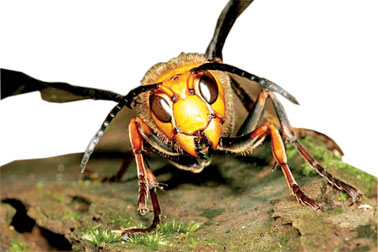|

Giant hornet terrorising China
Death is lurking in Shannxi Province, China in the form of a giant
hornet. Swarms of these hornets are wreaking havoc especially in cities
such as Ankang, Hanzhong and Shangluo.
The attacks that began last July is still continuing and over 42
people have lost their lives and some 1,600 others injured.
 According to Justin O. Schmidt, an entomologist at the Southwest
Biological Institute in Tucson, Arizona the Asian giant hornet, known
scientifically as Vespa mandarinia, carries a venom that destroys red
blood cells, which can result in kidney failure and death. According to Justin O. Schmidt, an entomologist at the Southwest
Biological Institute in Tucson, Arizona the Asian giant hornet, known
scientifically as Vespa mandarinia, carries a venom that destroys red
blood cells, which can result in kidney failure and death.
But perhaps a bigger problem than the toxicity of the venom is
allergy, Schmidt says. Some people are naturally more allergic to
stinging insects than others; a sting can trigger a deadly anaphylactic
reaction, which may involve airway closure or cardiac arrest.
One of the victims is Mu Conghui, who was attacked in Ankang City
while looking after her millet crop.
"The hornets were horrifying," she told Xinhua, the Chinese state-run
news agency. "They hit right at my head and covered my legs. All of a
sudden, I was stung, and I couldn't move.
"Even now, my legs are covered with sting holes."
Two months, 13 dialysis treatments and 200 stitches later, Mu still
remains hospitalised and unable to move her legs.
It's unclear exactly what factor or factors has led to the hornets'
deadly season of human attacks.
Huang Rongyao, an insect expert with the Forestry Bureau of Ankang
City, said that local vegetation growth has increased hornet habitat,
and that two months of hot weather have made the insects much more
active.
"The problem with this particular hornet is that it's big, sort of
thumb-sized, and it packs a lot of venom," said entomologist Lynn
Kimsey, director of the Bohart Museum of Entomology at the University of
California, Davis.
"And its nests get fairly large, including maybe several hundred
individuals. They are aggressive, they are predatory, and they have been
known to kill and eat an entire colony of honeybees," she said.
 At 1.5 to 2 inches (four to five centimetres) long, the giant hornets
are found across many parts of East and Southeast Asia and are
especially well known in Japan. They're among the more dangerous
venomous insects of their type, Kimsey said, though others, like
Africanised bees and yellow jackets, can cause similar problems. The
giant hornets are attracted to human sweat, alcohol and sweet flavours
and smells. They are especially sensitive to when animals or people run.
Every breeding season, the giant hornets produce an average of 1,000 to
2,000 offspring, Schmidt said. At 1.5 to 2 inches (four to five centimetres) long, the giant hornets
are found across many parts of East and Southeast Asia and are
especially well known in Japan. They're among the more dangerous
venomous insects of their type, Kimsey said, though others, like
Africanised bees and yellow jackets, can cause similar problems. The
giant hornets are attracted to human sweat, alcohol and sweet flavours
and smells. They are especially sensitive to when animals or people run.
Every breeding season, the giant hornets produce an average of 1,000 to
2,000 offspring, Schmidt said.
In the meantime, staying well clear of the hornets is the best route
to safety, experts advise, but that's often easier said than done.
Disturbing them or merely passing too close for the hornets' comfort
can unleash a fierce retaliation. Some attacks seem especially
unprovoked.
Last September a swarm attacked a school in southern China, injuring
30 people.
Not only humans, these giant hornets are a major threat to honeybees
too. They are able to quickly decimate a hive of thousands of honeybees,
leaving behind a trail of severed heads and limbs.
The hornets routinely fly miles from their nests and employ scouts to
locate a bee colony and then mark it with a special pheromone that
attracts their allies to attack, destroy, and occupy the hive.
With their huge size advantage, the hornets typically make short work
of the bees, unless the victims are able to eliminate the advance scout
before it can summon others.
They sometimes do so with an incredible defence - swarming the hornet
in a ball.
Often, however, the bees and other insect victims become fodder for
the growth of the hornet hive.
Adult workers chew their victims' flesh into a nutritious paste that
feeds larvae, which in turn produces saliva that serves as a powerful
"energy drink" to be consumed by adults who cannot digest solid protein.
Meanwhile, local authorities have deployed thousands of police
officers and locals to destroy the hives. About 710 hives have been
removed and at least seven million Yuan (about $1.1 million U.S.) sent
to areas affected by hornets, according to a press release.
Now government officials have started fighting fire with fire -
literally - by burning and gassing the thumb-sized creatures out of
their hives.
Workers wearing protective clothing have moved in to eradicate the
nightmare insects before any more people are injured.
Horrific pictures have emerged of wounds the size of bullet holes
left in the arms of victims after being stung.
Despite these stringent measures the death threat remains to humans
in this region.
No babysitter: Man takes child to burgle shop!
 Paul McGraw of Dixon has been charged with felony, burglary and
conspiracy, and a misdemeanour's charge of wilful cruelty of a child. Paul McGraw of Dixon has been charged with felony, burglary and
conspiracy, and a misdemeanour's charge of wilful cruelty of a child.
The first charge can be justified as Solano Count Sherkk's deputies
found items from the shop he and his friend burgled, in his car. But for
the second charge the question is raised how a burglar can wilfully be
cruel to a child while on the act of robbery.
According to newspaper reports the owner of the shop in an
unincorporated area of Dixon in Northern California detained one of the
burglars and with the help of Sheriff's deputies searched the suspect's
car and found items from the shop and a child.
When his friend Dean Forrest French called for this job 34-year-old
Paul was unable to find a baby sitter to keep his infant till he came
back.
Hence the only thing he could do was take the child with him to do
the job of burgling the shop.
The court ordered that the baby be handed over to Child Protective
Services. The deputies also arrested 37-year-old Dean Forrest French of
Vacaville, who faces burglary and conspiracy charges.
|

